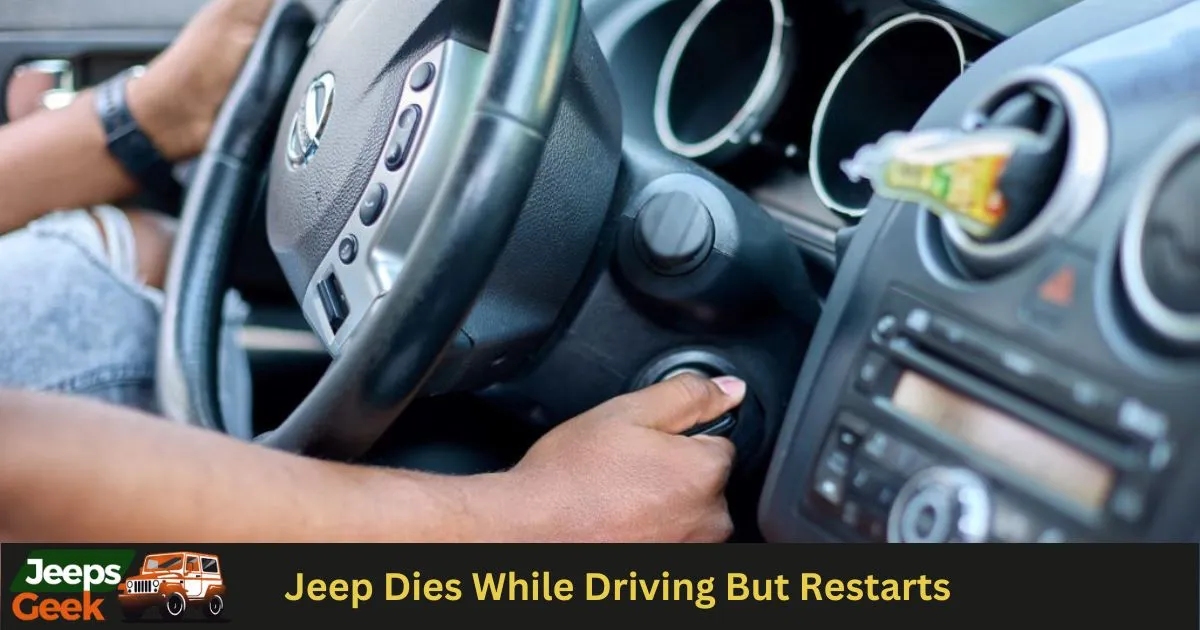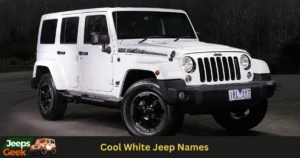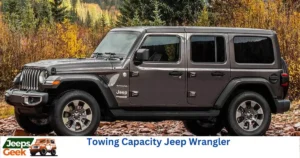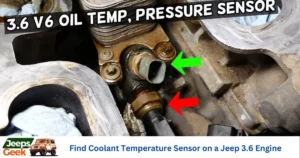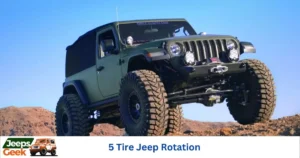Imagine the frustration of a Jeep enthusiast when their beloved vehicle suddenly sputters to a halt. The silver lining is that if it kicks back to life after a bit, you can steer clear of being stuck and pull over to a safe spot.
If you’ve been grappling with this hiccup for a while, know that you’re not alone. The real headache is dealing with it without any error codes or the engine light giving a hint.
In such a situation, continuing to drive the Jeep can be dicey, making an instant fix crucial. Keep reading to discover the causes so you can take the right steps to address the quirky issue.
Why Does Jeep Die While Driving But Restart?
Ever wondered why your Jeep decides to take an unexpected nap, only to wake up like nothing happened? Well, the mystery varies based on your Jeep’s model and age. Let’s dive into some usual suspects. – take a peek:
| Possible Culprits |
| Crankshaft position sensor issues |
| Inadequate fuel pressure |
| Faulty battery cables |
| Connection problems and vacuum leaks |
| Inoperative throttle body or throttle position sensor |
| Bad battery or alternator |
| Defective ECU |
These are the usual suspects causing your Jeep to play hide and seek. Now, let’s uncover the solutions to keep your Jeep running smoothly!
Which Jeep Models Are More Prone To This Issue?

Every car is unique, and even vehicles of the same model can have different issues. Instead of stressing over problems or seeking solutions from others, it’s crucial to understand how your Jeep works.
However, some Jeep models often encounter problems with engine stalling and restarting. The most complained-about models include Jeep Grand Cherokee Limited, Jeep Grand Cherokee Laredo, Jeep Wrangler JK, Jeep Wrangler Sahara, Jeep Wrangler Sport, Jeep Rubicon, Jeep Cherokee Sport, and Jeep Comanche.
Keep in mind that while we’ve listed these models, not every model year faced the same issues. Your Jeep might have its own unique quirks.
Read Also: Why Are Jeep Wrangler So Expensive With High Mileage?
Troubleshooting And Fixing A Jeep That Dies While Driving But Restarts Afterwards
It’s entirely normal to feel a bit anxious when your Jeep keeps stalling and restarting frequently. The reassuring news is that, most of the time, the reasons behind it are not too serious and can be resolved with quick fixes.
Let’s delve into the common causes of this issue and explore the solutions below.
1. Issue with the crankshaft position sensor
If you check out how others deal with a similar problem in their Jeeps, many mention issues with the crankshaft position sensor.
When this sensor starts acting up, it can lead to your Jeep stalling and restarting off and on until it finally gives out. Once it’s entirely kaput, there’s no spark at the distributor, and your Jeep won’t start. Many people have shared their experiences with crankshaft sensor problems, often without any error codes.
The Jeep Wrangler JK and Sahara seem to get the most complaints about the crankshaft sensor. The good news is that replacing the crankshaft position sensor is quite straightforward.
While aftermarket sensors are usually not too pricey, most experts suggest going for the Mopar crankshaft position sensor, which might set you back around $150.
2. Inadequate fuel pressure
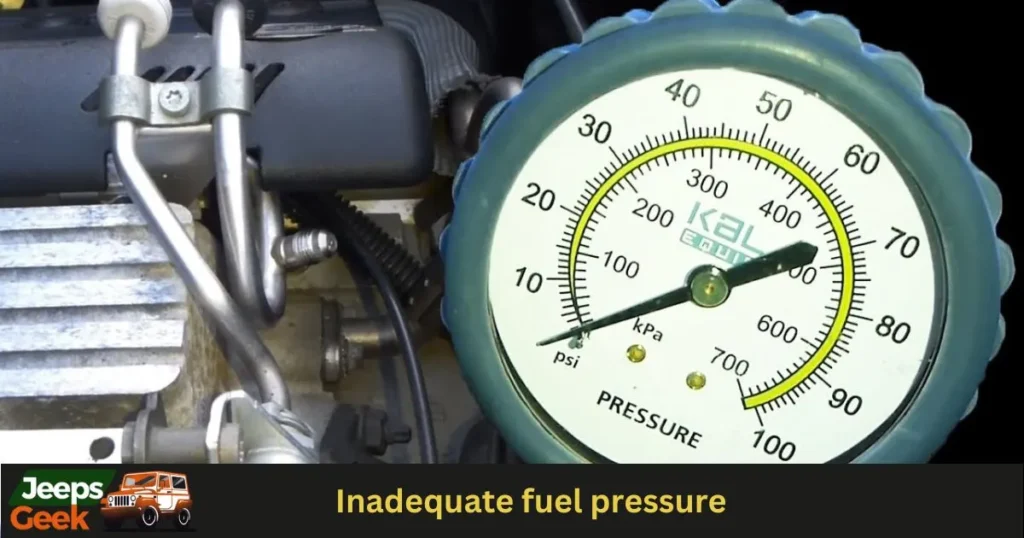
Those with years of Jeep experience often recommend a straightforward method for troubleshooting: measure the fuel pressure using a gauge. Low fuel pressure frequently emerges as the main troublemaker causing engine stalling.
Various components contribute to maintaining proper fuel pressure, but a frequent culprit is a malfunctioning fuel pump. It might go awry due to issues like a faulty fuel pump relay, loose terminals, malfunctioning fuel injectors, or a blown fuse.
While investigating, it’s worth giving the fuel filter a once-over. If it’s accumulated dirt, it could disrupt your Jeep’s normal functions. Sometimes, a simple solution could be changing the fuel filter
3. Faulty or corroded battery cables
The second most frequent troublemaker in this situation revolves around the battery’s connections. When the battery cables in your Jeep become loose or gather dirt over time, they can result in signal loss, causing the system to suddenly shut down.
Once the signal is back on track, your Jeep springs back to life. While it may seem like a simple hiccup, if it becomes a recurring theme, it can take a toll on your vehicle.
Many seasoned Jeep enthusiasts suggest keeping an eye on the battery’s terminals and connections. Make sure they are snugly secured and free from corrosion. If you spot dirt or rust, take them out and give them a thorough cleaning.
4. Connection problems and vacuum leaks
At times, cables and wires decide to play it loose, overheat, or get all corroded. Any of these shenanigans can lead to the engine deciding to take a break.
Take, for instance, a user who shared dealing with a misbehaving wire from the alternator to the battery. This little troublemaker caused the engine to throw a fit and then reboot. Despite trying to swap out other parts, it turned out that a simple wire replacement was the real hero in the end.
While it’s nearly impossible to play detective while cruising, trying to figure out if there’s a wiring or connection hiccup, you can give them a once-over later to see if that does the trick.
Now, if the spark plugs or the ignition switch in your Jeep are feeling a bit lazy, they too can throw a party and shut down the engine.
Another common party crasher is vacuum leaks. It’s not a good idea to keep cruising around if your Jeep is leaking. If you catch any vacuum leaks, it’s wise to get them sorted out pronto.
5. Bad battery or alternator
The sweet spot for a Jeep battery’s lifespan is usually 3 to 5 years, but that depends a lot on how often you use it and how well you take care of it. If your Jeep is your trusty sidekick on many adventures, the battery might wave the white flag earlier than expected.
Now, here’s the plot twist – a bad alternator can join the scene. If the alternator decides to throw in the towel, it can play the Grim Reaper for your battery, leading to the engine giving up the ghost.
Keep in mind that the battery temperature sensor could also be the culprit. If your battery or any of its buddies start feeling the heat, it can trigger the battery temperature sensor to pull the plug on the engine. Swapping out the problematic battery could be the key to putting this issue to rest.
6. Inoperative throttle body or throttle position sensor
A wonky throttle body or a misbehaving throttle position sensor might be the mischief-makers. Surprisingly, just giving the throttle body a good cleaning seemed to do the trick for many.
If that doesn’t sort out the hiccup, it’s detective time—test the throttle position sensor. A faulty sensor can play a prank on your Jeep, making it stall and then act like nothing happened, starting right back up. The good news? You can swap out the sensor yourself. While you’re at it, give the idle screw a once-over and tweak it as needed.
7. Defective ECU
A glitchy Engine Control Unit (ECU) is a frequent headache, especially for the older members of the Jeep family. When the ECU decides to throw a tantrum, it can play the disruptor during the ignition process, abruptly causing the engine to take a break.
And just like that, when it decides to behave again, the engine springs back to life.
The ECU, being the brains of the operation, can also get a bit overheated and stir up trouble. Detecting occasional hiccups in the ECU can be like finding a needle in a haystack.
If you’re scratching your head and can’t pinpoint the issue, the ECU might be the mischief-maker. It’s wise to call in an expert to diagnose and work their magic.
Should you keep driving if your Jeep dies but restart?
Driving a Jeep that keeps stalling and restarting is not the safest bet. However, whether you should continue driving depends on your specific situation.
While the issue may not come with significant risk factors, picture yourself stuck in the middle of the road, unable to kick your Jeep back into action! It’s a scenario best avoided. So, it’s crucial to address the problem pronto to steer clear of getting stranded without a helping hand.
There’s also the potential danger of your Jeep deciding to take a break on busy roads. If it decides to stall at the wrong moment, it can pose a life-threatening situation for you and others on the road.
If, for some reason, you must use your Jeep in this state until you can fix it, try to limit your trips to short distances.
Avoid bustling roads with heavy traffic, stick to the right side, and flick on those emergency lights for added safety.
Expert Tips To Prevent Your Jeep From Dying On The Road

While it’s challenging to completely prevent a Jeep from stalling on the road, you can certainly minimize the chances. One effective approach is to regularly maintain every part of your Jeep. Here are some expert tips to keep you cruising smoothly:
- Regularly inspect the air filter and fuel filter
- Maintain optimal levels of oil and coolant
- Keep a close eye on tire pressure and conditions
- Periodically check the battery and replace it as needed
- Examine terminals and wires for any loose connections
- Ensure all sensors are in good working condition
- Regularly check for leaks
- Take your Jeep for routine maintenance
- Monitor transmission fluid levels
- Inspect the brake system, including pads, discs, and fluid
- Evaluate suspension components for stability
- Check spark plugs and the ignition system for proper functioning
- Inspect the exhaust system for leaks, rust, or damage
- Maintain a clean fuel system with high-quality fuel and periodic cleaning
- Keep an emergency kit in your Jeep with essentials like jumper cables and tools
Following these tips can go a long way towards preventing unexpected stalls and keeping your Jeep in top-notch condition.
Conclusion
If your Jeep frequently stalls, you might restart it unless something has completely failed, but that’s not a good long-term solution.
Instead of guessing and spending money on uncertain fixes, it’s better to carefully check the parts causing the issue and fix them properly.
Some tasks, like securing terminals and cleaning dirty components, are easy to do. But for more complicated tasks, like replacing the ECU, it’s best to get help from an expert.

I’m Matthew Porter, crafting Jeep expeditions at “Jeeps Geek.” Drawing on my hands-on experience and love for all things Jeep, I’m here to guide you through modifications, resolve issues, and share the joy of being a Jeep geek.
